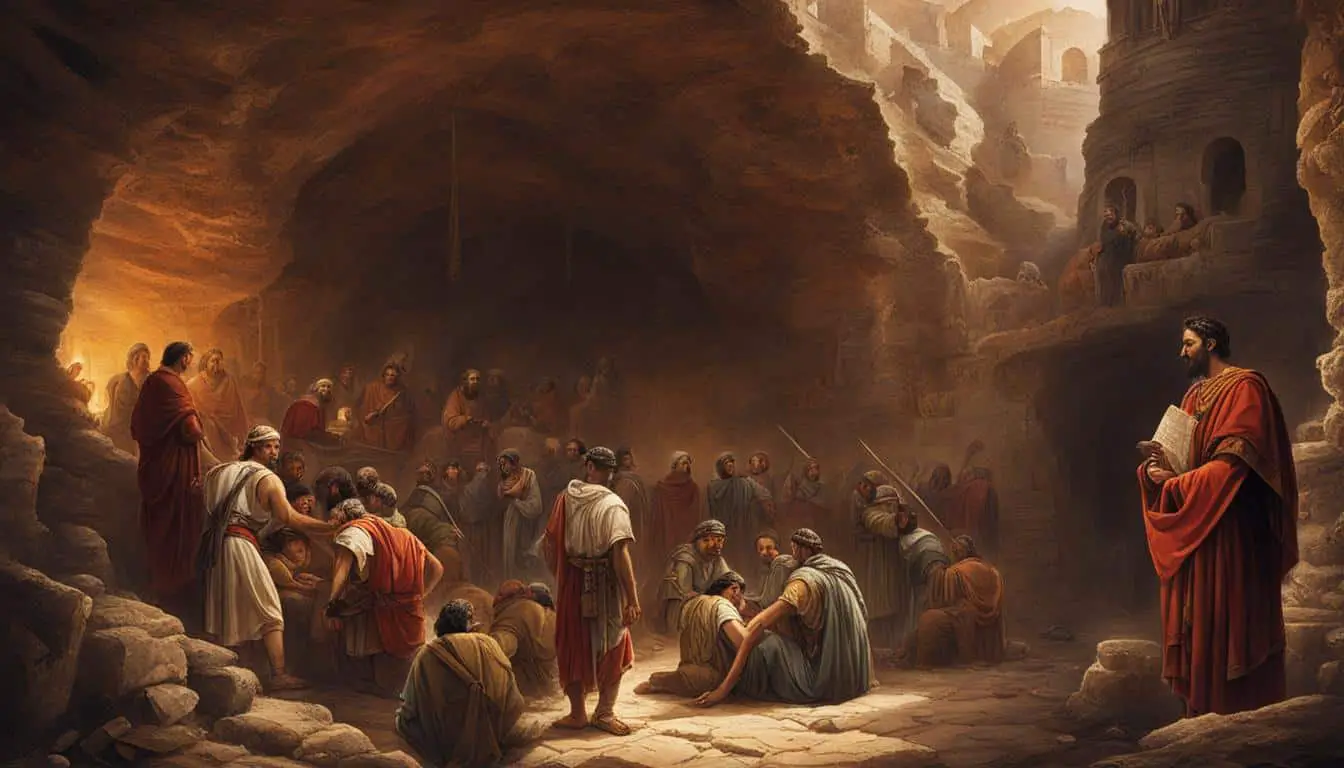
The Roman Empire played a significant role in the spread and development of early Christianity. The efficiency and extensive road system of the empire facilitated the communication and movement of missionaries like Paul, who traveled across the empire preaching the Christian message. The Roman Empire’s modern communications also helped spread the teachings of Jesus to Jewish communities throughout the empire. As the Christian movement expanded, it began to accept non-Jewish members, leading to a relaxation of ancient Jewish laws and the gradual emergence of Christianity as a new and separate religion. However, Christianity also faced persecution, particularly under Emperor Nero, who blamed Christians for the Great Fire of Rome and executed many followers of Jesus. Despite these challenges, Christianity continued to grow, gaining toleration and eventually becoming the official religion of the Roman Empire under Emperor Constantine in 313 AD.
Key Takeaways:
- The Roman Empire played a crucial role in the spread and development of early Christianity.
- The empire’s efficient road system facilitated the movement of missionaries like Paul and the communication of the Christian message.
- The Roman Empire’s modern communications helped spread the teachings of Jesus to Jewish communities throughout the empire.
- Christianity, as it expanded, began to accept non-Jewish members, leading to the relaxation of ancient Jewish laws and the emergence of Christianity as a new religion.
- Despite facing persecution, Christianity continued to grow and eventually became the official religion of the Roman Empire under Emperor Constantine.
Spread and Coexistence of Christianity in the Roman Empire
The religious impact of the Roman Empire on the rise of Christianity cannot be understated. The empire’s political unification and extensive road system played a crucial role in the spread of the Christian message throughout the empire. The efficient communication and transportation networks allowed missionaries, such as Paul, to travel and preach the teachings of Jesus to diverse communities. These missionaries were able to reach Jewish populations, as well as non-Jewish individuals who were open to incorporating new religious beliefs into their existing practices.
One of the factors that contributed to the coexistence of Christianity with other religions in the Roman Empire was its inclusive nature. Christianity allowed people to add Jesus to their pantheon of gods, making it compatible with their existing religious beliefs. This inclusive approach appealed to a wide range of individuals, irrespective of their regional or religious background. Additionally, the translation of Christian gospels from Aramaic to Greek played a vital role in making the teachings of Jesus accessible to a larger audience within the empire.
Despite its growing popularity, Christianity faced sporadic persecution during the first and second centuries, particularly during periods of political and economic distress. However, it wasn’t until Emperor Constantine’s conversion and the enactment of the Edict of Milan that Christianity gained widespread acceptance and official recognition within the empire. This marked a significant turning point in the history of Christianity in the Roman Empire, as it signaled the end of state-supported persecution and paved the way for Christianity to become the official religion of the empire.
| Factors | Impact |
|---|---|
| Inclusive nature of Christianity | Allowed for coexistence with other religions, attracting a diverse range of followers |
| Efficient communication and transportation networks | Facilitated the spread of the Christian message and the movement of missionaries |
| Translation of Christian gospels | Increased accessibility of the teachings of Jesus to a larger audience |
| Emperor Constantine’s conversion and the Edict of Milan | Ended state-supported persecution and led to the official recognition of Christianity |
Factors Contributing to the Spread of Christianity
When examining the factors that influenced the spread of Christianity in the Roman Empire, it becomes clear that it was not solely the work of missionaries like Paul. Ordinary Christians played a significant role in sharing the message of Jesus with their communities, friends, and family members. It was through these personal conversations and interactions that the faith began to take root and gain traction among the population.
One of the key factors that contributed to the success of Christianity was its inclusive nature. Early Christians, such as Paul, emphasized that conversion to Christianity did not require adherence to Jewish laws, making it more accessible to individuals from diverse backgrounds. This openness and acceptance appealed to many who were hesitant to convert due to cultural or religious barriers, enabling Christianity to spread beyond its initial Jewish roots.
“The willingness of early Christians to engage with others and accept them into the faith, regardless of their regional or religious background, played a crucial role in the religion’s expansion.”
Additionally, the sporadic persecution faced by Christians within the Roman Empire inadvertently helped fuel the spread of Christianity. Although initially confined to specific regions, the Great Persecution under Emperor Diocletian marked a turning point. However, it was the subsequent conversion of Emperor Constantine and the subsequent end of state-supported persecution that truly paved the way for Christianity’s recognition and acceptance within the empire.
Overall, the spread of Christianity in the Roman Empire was not solely driven by missionaries or official decrees. It was the everyday actions of regular Christians, along with the inclusive nature of the faith, and the changes in Roman policy that ultimately led to its widespread adoption and accelerated growth.

Conclusion
The Roman Empire played a significant role in the spread and development of early Christianity. Despite facing challenges, such as persecution and misunderstanding, the empire also provided crucial opportunities for the religion to flourish. The efficiency of the Roman Empire’s communication and transportation systems facilitated the dissemination of the Christian message, allowing it to reach regions far and wide.
Furthermore, the political unification of the empire and its inclusive religious culture allowed Christianity to coexist and gain acceptance among diverse populations. This inclusive approach to religion was instrumental in Christianity’s ascent, as it appealed to individuals from various regional and religious backgrounds. The translation of Christian gospels from Aramaic to Greek also played a key role in expanding the audience and accessibility of the faith.
Ultimately, the conversion of Emperor Constantine marked a significant turning point in the history of Christianity. With his conversion and the subsequent recognition of Christianity as the official religion of the Roman Empire, the faith solidified its position and set the stage for its future development as a dominant religion in the Western world. The influence of the Roman Empire on early Christianity cannot be overstated, as it shaped the growth and evolution of the faith, leaving a lasting impact that is still felt today.
FAQ
What impact did the Roman Empire have on the spread and development of early Christianity?
The Roman Empire played a significant role in the spread and development of early Christianity. The efficiency and extensive road system of the empire facilitated the communication and movement of missionaries, enabling the Christian message to reach various regions. Additionally, the empire’s modern communications helped spread the teachings of Jesus to Jewish communities throughout the empire, leading to the emergence of Christianity as a new and separate religion.
How did Christianity spread within the Roman Empire despite persecution?
The spread of Christianity in the Roman Empire was aided by the empire’s political unification and extensive road system. Many people in the empire viewed Christianity as compatible with their existing cultural and religious practices, which allowed Christianity to gain popularity among a diverse range of individuals. Additionally, the translation of Christian gospels from Aramaic to Greek made them accessible to a larger audience. Persecution was sporadic and regionally specific until Emperor Constantine’s conversion, which brought an end to state-supported persecution and paved the way for the official recognition of Christianity.
Who played a crucial role in the spread of Christianity in the Roman Empire?
While missionaries like Paul played a role in spreading Christianity, it was everyday Christians who had conversations and interactions with their neighbors, friends, and family members that were most influential. The belief that Christianity was a religion for anyone, regardless of regional or religious background, also contributed to its spread. By preaching that conversion to Christianity did not require adherence to Jewish laws, it became more accessible to hesitant individuals. Ultimately, the conversion of Emperor Constantine and the subsequent recognition of Christianity as the official religion of the Roman Empire marked a turning point in its history.
What was the impact of the Roman Empire’s conversion to Christianity?
The Roman Empire’s conversion to Christianity marked a significant turning point in the history of the faith. It brought an end to state-supported persecution of Christians and paved the way for the official recognition of Christianity within the empire. This recognition facilitated the further growth and development of Christianity as a dominant religion in the Western world.








